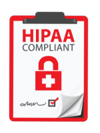7 Best Security Practices for HIPAA Compliance (2025)
October 15th, 2025 | 3 min. read

This post was originally published on February 22, 2018 and has been revised for clarity and comprehensiveness.
HIPAA compliance protects patient privacy and reduces your breach and audit risk. The fastest path is a focused plan that pairs required safeguards with ongoing governance and staff training.
Hospitals often struggle with unclear scope, tool overlap, staff mistakes, and vendor risk. Intelligent Technical Solutions (ITS) helps regulated organizations assess risk, fix control gaps, train teams, and document evidence so audits run smoothly and operations stay secure.
In this guide you will learn:
- What HIPAA is and who's required to comply
- Seven security best practices that work,
- Where most organizations slip, and,
- FAQs about the best security practices for HIPAA compliance.
Our recommendations reflect hands-on work supporting hundreds of regulated businesses and align with HHS/OCR guidance, NIST controls, and CISA best practices.

After reading, you should be well on your way to compliance.
What is HIPAA and who must comply?
HIPAA is a federal law that sets privacy, security, and breach notification standards for protected health information (PHI).
Covered entities and business associates that create, receive, maintain, or transmit PHI (Protected Health Information) must comply. If you do not, you can experience:
- Fines, investigations, and corrective action plans consume time and budget
- Breaches drive patient churn and reputational damage
- Many incidents start with preventable issues like weak identity controls or poor vendor oversight
.png?width=778&height=500&name=List%20of%20why%20you%20should%20comply%20with%20HIPAA%20(2).png)
What are the 7 best security practices for HIPAA compliance?
1) Conduct a risk analysis
 Perform a documented risk analysis that lists threats, vulnerabilities, likelihood, impact, and current controls across administrative, physical, and technical safeguards. Update it at least annually and after material changes.
Perform a documented risk analysis that lists threats, vulnerabilities, likelihood, impact, and current controls across administrative, physical, and technical safeguards. Update it at least annually and after material changes.
Takeaway: The risk analysis drives your remediation plan, budget, and audit evidence.
2) Limit access to appropriate personnel only
 Implement identity and access management with least privilege and MFA, encrypt PHI in transit and at rest, deploy endpoint protection with monitoring, enable centralized logging, and enforce secure configuration baselines and patching.
Implement identity and access management with least privilege and MFA, encrypt PHI in transit and at rest, deploy endpoint protection with monitoring, enable centralized logging, and enforce secure configuration baselines and patching.
Takeaway: Start with identity, backups, and endpoint protection; then layer monitoring and logging.
3) Implement technical and physical safeguards
 Control facility access, secure workstations and servers, protect portable media, and implement visitor procedures. Lock rooms, cabinets, and devices that store PHI. Maintain disposal and media reuse procedures.
Control facility access, secure workstations and servers, protect portable media, and implement visitor procedures. Lock rooms, cabinets, and devices that store PHI. Maintain disposal and media reuse procedures.
Takeaway: Physical controls prevent easy data loss and prove due care.
4) Train employees on HIPAA regulations
 Provide annual HIPAA training for all staff and role-based training for privileged users. Add phishing awareness and periodic tabletop exercises for incident response.
Provide annual HIPAA training for all staff and role-based training for privileged users. Add phishing awareness and periodic tabletop exercises for incident response.
Takeaway: Training lowers incident frequency and improves audit outcomes.
READ: Security Awareness Training: What It Is and Why It's Important
5) Develop and enforce policies and procedures
 Document policies for access, authentication, minimum necessary use, device and media controls, transmission security, incident response, breach notification, and contingency planning. Track versions, approvals, and attestations.
Document policies for access, authentication, minimum necessary use, device and media controls, transmission security, incident response, breach notification, and contingency planning. Track versions, approvals, and attestations.
Takeaway: Auditors look for written policy, staff acknowledgement, and proof that controls operate.
6) Perform regular audits and monitoring
 Review access logs, admin actions, and system alerts. Run vulnerability scans, remediate findings, and test backups and recovery. Capture evidence with dates, owners, and results.
Review access logs, admin actions, and system alerts. Run vulnerability scans, remediate findings, and test backups and recovery. Capture evidence with dates, owners, and results.
Takeaway: Continuous monitoring proves compliance is maintained, not just achieved once.
7) Ensure business associates are HIPAA-compliant
 Inventory vendors, execute Business Associate Agreements (BAAs), and assess their safeguards. Prepare standardized security questionnaires and require incident notice, encryption, and minimum controls.
Inventory vendors, execute Business Associate Agreements (BAAs), and assess their safeguards. Prepare standardized security questionnaires and require incident notice, encryption, and minimum controls.
Takeaway: Your compliance posture includes your vendors; require and verify controls.
Where do most organizations overspend or fall short?
Most healthcare organizations overspend when it comes to:
- Buying overlapping tools without a risk-based plan
- Writing policies that staff do not follow
- Skipping vendor due diligence and BAA updates
- Testing backups rarely or not at all
Ready for the next step to pass a HIPAA audit?
Strong HIPAA programs start with a risk analysis, implement high-impact safeguards, train people, and prove operations with monitoring and evidence.
These seven practices address the most common audit findings and breach causes while keeping spend focused on real risk.
ITS helps healthcare organizations and business associates put these controls in place, maintain them year-round, and walk into audits with confidence.
Schedule a consultation with our IT experts today.
MORE RESOURCES:
- The Ultimate Guide to Managed IT for Healthcare
- HIPAA Compliance is not optional - it's the law
- The HIPAA Compliance Checklist
FAQs (Frequently Asked Questions)
Q: Do small businesses need HIPAA compliance?
A: Yes. Any covered entity or business associate that handles PHI must comply, regardless of size.
Q: How often should I update my HIPAA risk analysis?
A: Update it at least annually and after significant changes like system migrations, mergers, or security incidents.
Q: Do I need a BAA with every vendor?
A: You need BAAs with vendors that create, receive, maintain, or transmit PHI on your behalf, and you should assess their safeguards.
Q: What training is required for HIPAA?
A: Provide annual HIPAA training for all workforce members, role-based training for privileged users, and incident response exercises.
Q: What evidence do auditors expect?
A: Risk analysis, remediation records, approved policies with attestations, training logs, BAA inventory, monitoring results, and tested backups.
Kharmela Mindanao is a senior content writer for Intelligent Technical Solutions. She’s called Ella by her friends and likes yoga, literature, and mountain climbing. Her favorite book is Anxious People by Fredrik Backman. She creates art and poetry and is on a quest to find the best cheesecake.
Topics:

